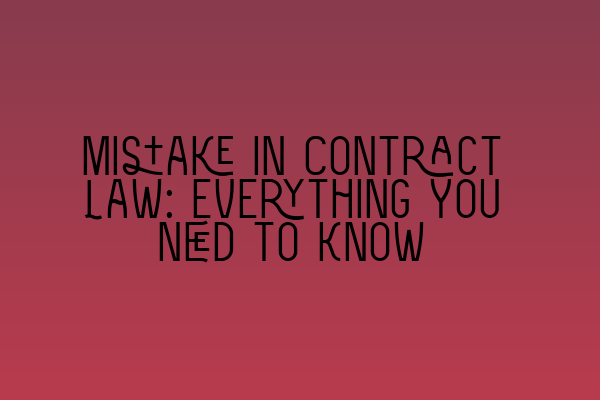Mistake in Contract Law: Everything You Need to Know
In contract law, mistakes can have significant implications on the validity and enforceability of a contract. Whether you are a solicitor, law student, or just someone interested in contract law, understanding the different types of mistakes that can occur and their effects is crucial. In this article, we will explore the concept of mistake in contract law and provide you with a comprehensive overview.
What is a Mistake in Contract Law?
A mistake, in the context of contract law, refers to an error or misconception that exists at the time the parties entered into the contract. Mistakes can occur in various forms, including mistakes of fact, mistakes of law, and mutual mistakes.
Mistakes of Fact
A mistake of fact arises when one or both parties make an incorrect assumption about a material fact relating to the contract. For example, if a seller mistakenly believes that the goods being sold are in perfect condition, but in reality, they are faulty, a mistake of fact exists. In such cases, the mistaken party may seek to rescind the contract or request damages to rectify the harm caused by the mistake.
It is worth noting that not all mistakes of fact render a contract void. Courts will assess the gravity of the mistake, its effect on the contracting parties, and the availability of alternative remedies before determining the appropriate course of action.
Mistakes of Law
A mistake of law occurs when one or both parties are mistaken about the legal implications or consequences of their actions. Unlike mistakes of fact, mistakes of law generally do not provide a valid basis for rescinding a contract. The general rule is that parties are expected to know the law, and ignorance of the law is not an excuse.
However, there are exceptions to this rule. In certain circumstances, where the mistake of law is fundamental, involves a statutory provision, or is induced by the other party, the contract may be voidable.
Mutual Mistakes
A mutual mistake arises when both parties are mistaken about the same material fact in the contract. Mutual mistakes can occur due to misunderstandings, clerical errors, or inaccurate representations. In such cases, either party may seek to have the contract voided or reformed to reflect the true intentions of the parties.
However, if the mistake is unilateral (i.e., only one party is mistaken), it may not be sufficient to invalidate the contract. The mistaken party would need to demonstrate that the non-mistaken party knew, or had reason to know, about the mistake and unfairly took advantage of it.
Effects of Mistakes in Contract Law
The effects of a mistake in contract law depend on the type of mistake and the specific circumstances of the case. As discussed earlier, some mistakes may render the contract void, while others may only make it voidable or entitle the mistaken party to seek damages.
SQE Sample Papers: Practice for Exam Success
Rescission
Rescission is the legal remedy available to a party seeking to cancel or set aside a contract due to a mistake. It is an equitable remedy that aims to restore the parties to their pre-contractual positions. Rescission can be sought when a contract is voidable due to a mutual mistake, unilateral mistake, or a mistake induced by misrepresentation or fraud.
Rectification
Rectification is a remedy that allows the court to correct a mistake made in the written terms of a contract. It is applicable when there is a discrepancy between the written contract and the parties’ actual intentions. The court can modify the contract to accurately reflect the parties’ true intentions, provided there is clear and convincing evidence to support the correction.
Damages
In some cases, the mistaken party may seek damages as compensation for any losses suffered as a result of the mistake. The availability and calculation of damages will depend on the specific circumstances of the case and the applicable legal principles. It is essential to consult with a solicitor to determine the appropriate course of action for seeking damages in contract law cases.
To further enhance your knowledge in contract law and prepare for the Solicitors Qualifying Examination (SQE), be sure to check out these related articles:
- Focus Areas in SQE1 and SQE2: Mastering Key Concepts
- Adjusting Your SQE Strategy Based on Mock Performance
- Peer Discussions Post-Mock: Learning from Collaboration and Feedback
- Interactive Mock Tests for a Realistic SQE Experience
By exploring these resources, you will gain valuable insights and improve your understanding of contract law concepts necessary for success in the SQE.
In conclusion, mistakes can significantly impact the validity and enforceability of contracts. Understanding the types of mistakes and their effects is crucial when dealing with contract law matters. Whether you are a solicitor representing clients or a law student preparing for exams, make sure to familiarize yourself with the intricacies of mistake in contract law.
